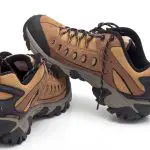Table of Contents
Are Trail Running Shoes Good For Hiking?
When it comes to hiking, one of the most critical pieces of gear is your footwear. Hiking shoes or boots are the go-tos for many hikers, but trail running shoes have become increasingly popular in recent years. The question is: are trail running shoes suitable for hiking?
As someone who has hiked in both hiking shoes and trail running shoes, I can confidently say that trail running shoes can be a great choice for hiking, depending on the trail and your personal preferences. Trail running shoes are designed to be lightweight, breathable, and flexible, making them a comfortable choice for long hikes. They also often have good traction, which can be important on rocky or uneven terrain.
That being said, it's important to understand the differences between trail running shoes and hiking shoes or boots and the requirements of the specific hike you're planning. In this article, we'll explore the basics of trail running shoes, the requirements of hiking, and the benefits and drawbacks of using trail running shoes for hiking. By the end, you'll better understand whether trail running shoes are a good choice for your next hike.
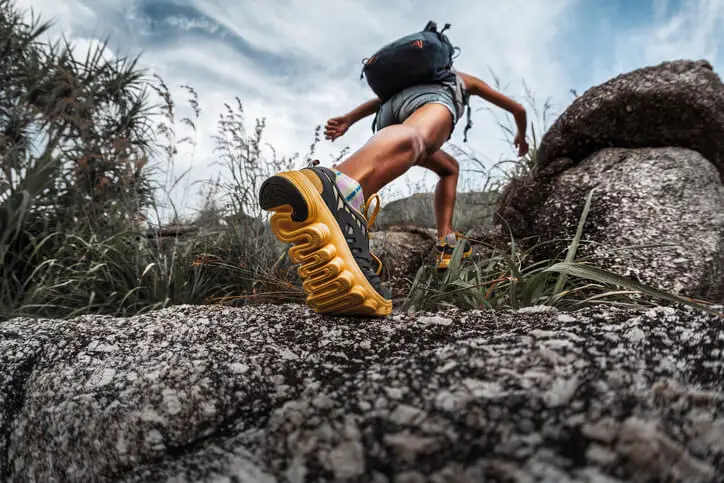
Key Takeaways
Trail running shoes can be a good choice for hiking, depending on the trail and your personal preferences.
It's important to understand the differences between trail running shoes and hiking shoes or boots, as well as the requirements of the specific hike you're planning.
Consider the benefits and drawbacks of using trail running shoes for hiking before making a decision.
Are Trail Running Shoes Good For Hiking?
Yes, trail running shoes can be used for hiking, but choosing shoes that provides enough support and protection for the terrain you'll be hiking on is important. Look for shoes with a durable sole, a protective toe cap, and a breathable upper.
The Basics of Trail Running Shoes
As someone who enjoys both trail running and hiking, I have often wondered if trail running shoes are suitable for hiking. Before answering this question, it is essential to understand the basics of trail running shoes.
Design and Structure
Trail running shoes are designed to provide stability and support on uneven terrain. They typically have a more aggressive outsole with larger lugs for better traction on slippery surfaces. The outsole is also designed to shed mud and debris, a common occurrence on trails.
The midsole of a trail running shoe is often thicker and firmer than that of a road running shoe. This is because the shoe needs to absorb the impact of running on rocky terrain. The upper of a trail running shoe is also more durable and protective to prevent damage from rocks and other debris.
Material and Durability
Trail running shoes are made from durable materials that can withstand the rigors of trail running. The upper is often made from synthetic materials that are lightweight and breathable. The midsole is usually made from EVA foam or other cushioning materials that can withstand repeated impact.
The outsole of a trail running shoe is made from durable rubber that can handle the abrasive surfaces of trails. The lugs are often made from sticky rubber for better traction on wet surfaces.
In terms of durability, trail running shoes are built to last. They are designed to withstand the wear and tear of trail running and can last for hundreds of miles. However, it is important to note that the lifespan of a trail running shoe will depend on the frequency and intensity of use.
Trail running shoes are designed to provide stability, support, and protection on uneven terrain. While they may not be specifically designed for hiking, they can be suitable for those who enjoy both activities.
Understanding Hiking Requirements
As someone who enjoys hiking, I understand the importance of having the right gear for the trail (especially hiking shoes or hiking boots). Regarding footwear, there is a debate about whether trail running shoes are a good alternative to hiking boots. In this section, I will discuss the hiking requirements when choosing the right footwear.
Terrain Challenges
Hiking trails can vary in terrain, from rocky and uneven to smooth and flat. It is important to consider the terrain challenges of the trail when choosing footwear. Trail running shoes are designed for off-road terrain, focusing on traction and stability. They are lightweight and flexible, making them a good choice for trails with minimal obstacles. However, if the trail is rugged or rocky, hiking boots may provide more ankle support and protection.
Foot Protection
Foot protection is essential when hiking, as it can prevent injuries and discomfort. Trail running shoes are designed to be breathable and lightweight, which can be an advantage on hot and dry trails. They also have a thinner sole, which allows for better ground feel and agility. However, hiking boots have a thicker sole and are designed to provide more protection from rocks and other obstacles on the trail. They also provide more ankle support, which can be beneficial on steep and uneven terrain.
Comfort
Comfort is key when it comes to hiking footwear. Trail running shoes are designed for comfort, with a focus on cushioning and breathability. They are also more flexible, which can be an advantage on longer hikes. However, hiking boots are designed to provide more support and stability, which can reduce fatigue and discomfort on longer hikes. They also have a more secure fit, which can prevent blisters and other foot injuries.
In conclusion, when deciding whether trail running shoes are good for hiking, it is important to consider the trail's terrain challenges, foot protection, and comfort requirements. Trail running shoes can be a good alternative to hiking boots on smooth and flat trails, but hiking boots may be a better choice on rugged and rocky terrain. Ultimately, the choice between trail running shoes and hiking boots will depend on personal preference and the specific requirements of the trail.
Comparing Trail Running Shoes and Hiking Shoes
When choosing footwear for hiking, there are two main options: trail running shoes and hiking shoes. As someone who has hiked in both types of shoes, I can offer some insights into the pros and cons of each.
Traction and Grip
One of the most important factors to consider when choosing hiking shoes is traction and grip. Hiking shoes typically have deeper lugs on the outsole, which provides better traction on rugged terrain. Trail running shoes, on the other hand, have a flatter outsole with smaller lugs designed to provide better grip on smoother surfaces like dirt or gravel trails.
If you plan to hike on rocky or steep terrain, hiking shoes may be a better option because they offer more stability and better grip. However, if you plan to hike on smoother trails or run on the trails, trail running shoes may be a better choice because they are lighter and more flexible.
Weight and Flexibility
Another factor to consider when choosing hiking shoes is weight and flexibility. Hiking shoes are typically heavier and stiffer than trail running shoes, making them feel clunky and uncomfortable on long hikes. Trail running shoes, on the other hand, are designed to be lightweight and flexible, which allows for a more natural stride and can reduce fatigue on long hikes.
If you plan to hike long distances or do multi-day hikes, trail running shoes may be a better option because they are lighter and more flexible. However, hiking shoes may provide better support and protection if you plan to do more technical hikes or carry a heavy pack.
Water Resistance
Finally, water resistance is an important factor to consider when choosing hiking shoes. Hiking shoes are typically made with waterproof or water-resistant materials, which can keep your feet dry in wet conditions. Trail running shoes, on the other hand, are often made with more breathable materials, which can be more comfortable in dry conditions but may not provide as much protection in wet conditions.
If you plan to hike in wet conditions or cross streams, hiking shoes may be a better option because they offer more protection from water. However, if you plan to hike in dry conditions or run on the trails, trail running shoes may be a better choice because they are more breathable and comfortable.
The choice between trail running shoes and hiking shoes depends on your individual needs and preferences. Both types of shoes have pros and cons, and it's important to consider factors like traction, weight, flexibility, and water resistance when deciding.
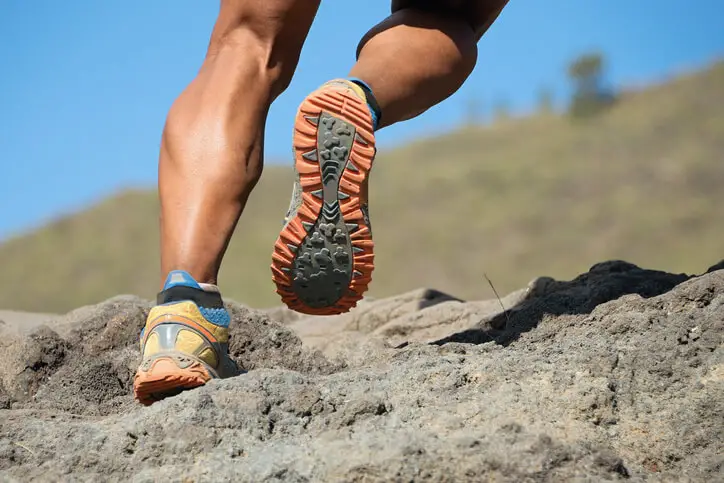
Benefits of Using Trail Running Shoes for Hiking
When it comes to hiking footwear, there are many options. While traditional hiking boots may be the most common choice, trail running shoes are becoming increasingly popular among hikers. As someone who has hiked with hiking boots and trail running shoes, I can confidently say there are several benefits to using trail running shoes for hiking.
Lightweight
One of the main advantages of trail running shoes over hiking boots is their weight. Trail running shoes are generally much lighter than hiking boots, which can make a big difference on long hikes. The weight savings can help you conserve energy and move quickly on the trail. In fact, according to Switchback Travel, the average pair of hiking boots weighs well over 2 pounds, while most hiking shoes hover around 1 pound. Trail runners are even lighter, with some models weighing less than 10 ounces per shoe.
Comfort
Another benefit of trail running shoes is their comfort. While hiking boots may offer more support and protection, they can also be stiff and uncomfortable, especially if you're not used to wearing them. Trail running shoes, however, are designed for comfort and flexibility. They often have a wider toe box, which can help prevent blisters and other foot problems. Additionally, many trail runners have more cushioned soles than hiking boots, making them feel more comfortable on long hikes.
Traction
While trail running shoes may not offer as much ankle support as hiking boots, they often have excellent traction. Many trail runners have aggressive tread patterns that can help you grip the trail and prevent slips and falls. This can be especially important when hiking on steep or rocky terrain. Additionally, some trail runners have built-in rock plates or other features that can protect your feet from sharp rocks and other hazards on the trail.
Versatility
Finally, trail running shoes are often more versatile than hiking boots. While hiking boots may be great for rugged terrain, they can be overkill for less challenging hikes. Trail running shoes, however, can be used for various activities, from running to hiking to walking around town. This makes them a great choice if you're looking for a shoe to do it all.
Overall, there are several benefits to using trail running shoes for hiking. They're lightweight, comfortable, offer good traction, and are versatile enough for various activities. While they may not be the best choice for everyone, they're worth considering if you're looking for new hiking footwear.

Potential Drawbacks of Using Trail Running Shoes for Hiking
As someone who has hiked with trail running shoes before, I can attest that they are not always the best option. While they can be a great alternative to hiking boots in certain situations, there are some potential drawbacks to using trail running shoes for hiking.
One of the biggest drawbacks is that trail running shoes are less durable than hiking boots. Hiking boots are designed to withstand the wear and tear of rough terrain, while trail running shoes are designed for speed and agility. Trail running shoes may not last as long as hiking boots, especially if you hike frequently or on rocky or rugged trails.
Another potential drawback is that trail running shoes may not provide as much ankle support as hiking boots. Hiking boots are designed to provide support and stability for your ankles, which can be especially important when hiking on uneven terrain or carrying a heavy backpack. Trail running shoes, on the other hand, are designed to be lightweight and flexible, which can make them less supportive.
Trail running shoes may also not be as waterproof as hiking boots. While some trail running shoes are designed to be water-resistant, they may not be able to withstand heavy rain or deep puddles. This can be especially problematic when hiking in wet or muddy conditions, as wet feet can lead to blisters and discomfort.
Finally, trail running shoes may not be as comfortable as hiking boots for long hikes. While trail running shoes are designed to be comfortable for running, they may not provide the same cushioning and support as hiking boots. This can lead to foot fatigue and discomfort, especially on longer hikes.
While trail running shoes can be a great alternative to hiking boots in certain situations, they are not always the best option. It's essential to consider the potential drawbacks before deciding whether to use trail running shoes for hiking.
What is the difference between a hiking shoe and a trail running shoe?
Hiking shoes are designed to provide support, stability, and protection for your feet while hiking on uneven terrain. They typically have a stiffer sole and a more durable upper to withstand the rigors of hiking. Trail running shoes, however, are designed for speed and agility on trails. They are lighter and more flexible than hiking shoes but may not provide the same level of support and protection.

Conclusion - Are Trail Running Shoes Good For Hiking?
I think trail running shoes can be a great alternative for hiking footwear. They are lightweight, comfortable, and provide enough support and traction for most hiking trails. However, it is important to choose the right pair of trail running shoes for hiking based on the terrain, weather conditions, and personal preferences.
When selecting trail running shoes for hiking, consider the following factors:
Weight: Trail running shoes are generally lighter than hiking boots, which can make a big difference if you plan a long hike or carry a heavy backpack. Look for lightweight shoes that still provide enough cushioning and support for your feet.
Traction: Trail running shoes have a different tread pattern than hiking boots, which can affect their performance on different terrains. Look for shoes with a sturdy and durable outsole that provides good traction on wet and dry surfaces.
Comfort: Trail running shoes are designed for running, which means they have a different fit and feel than hiking boots. Try different shoes and choose the ones that feel comfortable and supportive for your feet.
Trail running shoes can be a great choice for hiking if you prioritize weight, traction, and comfort. However, if you are planning a more challenging hike or carrying a heavy backpack, you may consider hiking boots for additional support and protection. Ultimately, the choice between trail running shoes and hiking boots comes down to personal preference and the specific demands of your hike.
- Are Merrell Shoes Good? – An Unbiased Review of Merrell Footwear - December 9, 2023
- Where Are Merrell Shoes Made? - December 9, 2023
- Camping in 40-degree Weather: Tips and Tricks - September 25, 2023

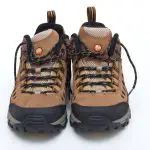
![Are Keen Sandals Good for Hiking? [Are They Really Good For Hike?] Are Keen Sandals Good for Hiking? [Are They Really Good For Hike?]](https://grandcircletrails.com/wp-content/uploads/2022/06/are-keen-sandals-good-for-hiki-1-150x150.png)
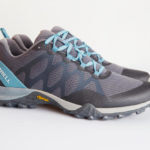
![Do Columbia Shoes Run Big or Small? [Here is the Answer] Do Columbia Shoes Run Big or Small? [Here is the Answer]](https://grandcircletrails.com/wp-content/uploads/2022/04/Do-Columbia-Shoes-Run-Big-or-Small-1-150x150.jpg)
